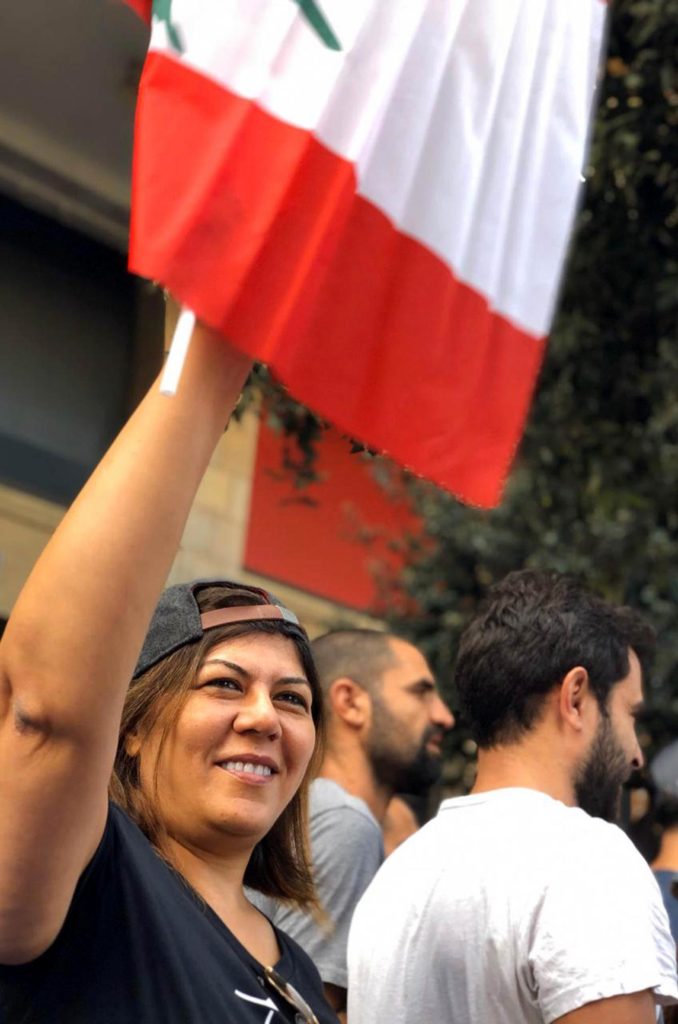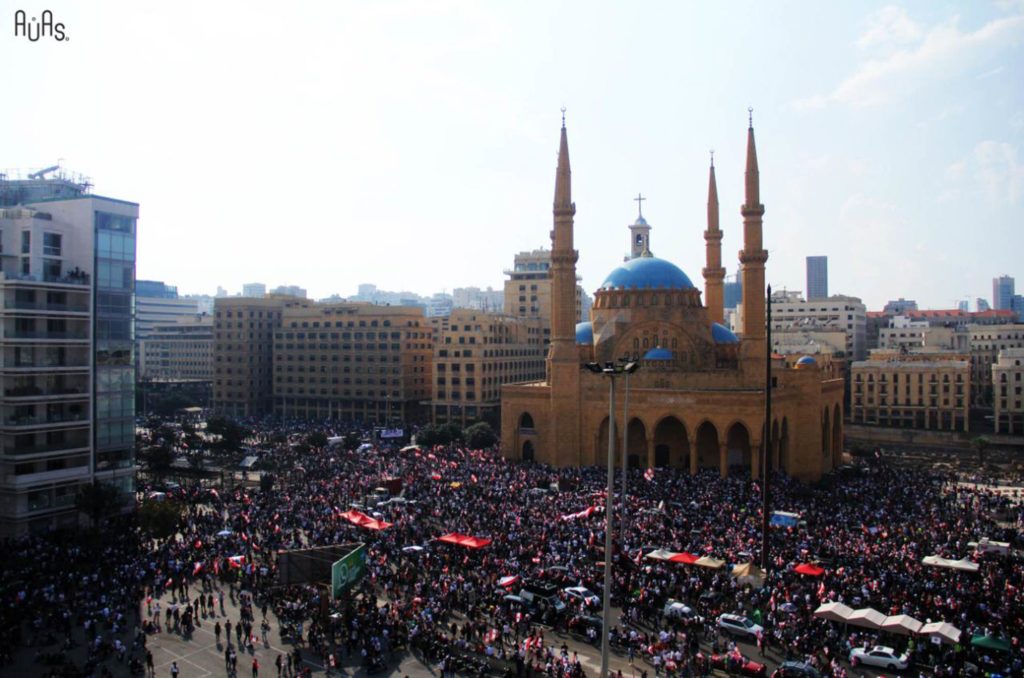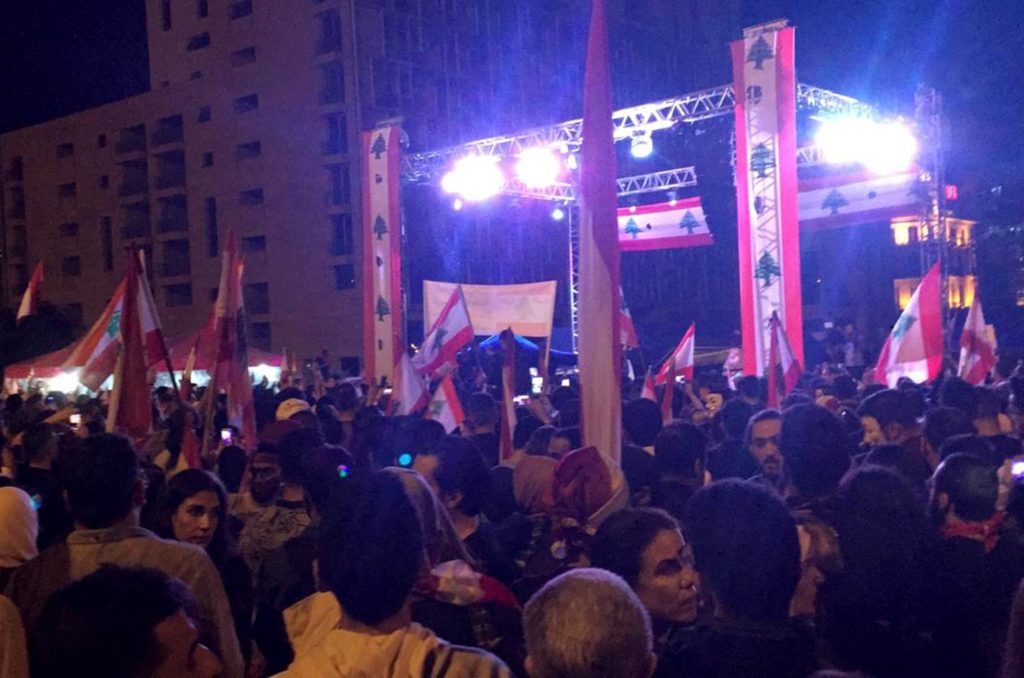Wildfires and mass protests – an update from Anera Lebanon
Posted in: News, Voices from the field
I am writing this from home because we haven’t been able to go to the office. This is now the ninth day of demonstrations. The day before yesterday the protests accelerated and there are now more roadblocks. Even if you live in Beirut you won’t be able to get from neighborhood to neighborhood in a car. All the main traffic points are blocked. Everybody is hopeful that these demonstrations will mean real, positive change for the country, but we also realize how difficult this will be.


The wildfires
The wildfires started on Monday of last week. It had been unusually hot and they spread really quickly. Fortunately, the fires were contained within the first few days, but the Chouf area was particularly hard hit. The area is known for its forests. There are still conflicting reports on exactly how much of the forest was destroyed and the scope of the damage. It’s apparent that large areas, thousands of acres of the forests, were burned. Some houses were damaged. One person from the civil defense forces died fighting the fires. It’s fortunate there weren’t more fatalities.
We need to take steps to prepare for wildfires like this in the future. Firefighters need to be better equipped. The forests will need time to recover. Experts say that replanting trees in the impacted areas is not advisable for now. The soil needs time to regenerate before the forest is replanted.
We plan for Anera to help by galvanizing our youth volunteers from our recycling and composting programs to remove the litter left by campers and hikers in the forests. This garbage can be flammable and it likely contributed to worsening the fires.
Anera prepared to provide relief to communities affected by the wildfires, but our response has been impacted by the demonstrations that have erupted around the country and the halt in governmental operations. We have shipments of medicines stuck awaiting clearance from public administrators who are unable to report to work.
Lebanon’s environment is under grave threat. The national symbol is the cedar tree but our beautiful forests are disappearing. In 2007, Anera planted cedar trees and fruit trees in 2008-2009. We have partnered with excellent environmental groups in Lebanon in the past, so we will look at what we can do going forward.
The Lebanon protests
Last Thursday evening, October 17, only a few days after the wildfires, large numbers of people gathered in cities across the country to protest corruption and the poor economy.
People have protested before in Lebanon but this is the first time that people have flooded into the streets on their own, without a call from the political parties. It’s the result of the dire economic situation of the last two years. Jobs are scarce. The currency has been dropping for quite some time against the U.S. dollar. And every day, it seems, we learn of some new scandal from the government. Amid all of this, politicians imposed new taxes on the people, which is what sparked the protests.
Poverty and hardship transcend all religious and regional differences. People are united across the country. It’s not only youth at the protests — it’s old and young alike, families who go with their children. Women are also playing a distinct role by standing between the army and the protests to prevent violence.
There is a lot of spontaneous mutual support. Volunteers sweep the streets and offer food and water to the protesters. Yesterday it was raining and a man offered me an umbrella! Even people who have never been active in civil society are very excited about the demonstrations and getting actively involved.


Anera’s activities and response
Our staff and volunteers are very excited about this change. Although we are working from home, we remain very active. Inside the Palestinian camps, most of our partner organizations are operational. Anera’s vocational, basic math and literacy classes are still running, although attendance is down. The solid waste sorting facility that we just opened in Bekaa is still operating.
Since the protests began, other Anera programs have largely been put on hold. All institutions, public and private, are suspended due to the roadblocks. Contractors, authorities, and partner organizations are not operating, so we can’t operate. But we are receiving regular situation reports and remain in daily communication with our partners.
The first two days we felt paralyzed but we’ve since moved to emergency contingency planning and there is a lot to do! Our field staff just finished conducting a survey of youth attitudes. Some office staff are catching up on administrative tasks. I’m meeting daily with people through video conference calls. With the banks closed for the past week, things like transferring salaries is a huge challenge, so that was my focus today.


The longer view
If this continues for many more weeks, shops will begin to run out of supplies. Things like bread and fuel will run low. And, of course, the banks remain closed.
Even after some degree of normalcy is restored, things will not be the same after these demonstrations. We will need to adjust our plans for Anera’s youth programs for instance. Young people are especially impacted by the new mood and we will have to take into account their new hopes and aspirations.
When the forest fires broke out last week, Palestinian youth from the refugee camps immediately volunteered to help with the response. They were born in Lebanon and are concerned about it. They feel they are a part of what is happening here. They are also active in the demonstrations. They feel that it is a just cause. And it might also be a venue for them to ask for their civil rights in Lebanon. It’s a very exciting time. In contrast, the Syrian youth are fearful. They’ve seen what can happen in response to protest movements.
This week, Anera and some other organizations conducted a youth poll coordinated by UNICEF. The idea was to survey youth in Lebanon across gender and nationality, on their attitudes before and after the protests. Anera staff and volunteers talked to 558 young people — Lebanese, Syrians and Palestinians across the country — asking if they’ve participated in the demonstrations, how they identify themselves with political parties and with the nation as a whole, and their main aspirations for the demonstrations.
Our survey revealed that the demonstrations have lessened sectarianism. Youth in Lebanon feel that to build a better future they need to be united as Lebanese. Many were never active in social or political movements before, but now they are energized. They want to see social, political, and economic change, and most importantly, they want to have their voices heard.
OUR BLOG
Related
Joint Statement 200+ NGOs call for immediate action to end the deadly Israeli distribution scheme (including the so-called Gaza Humanitarian Foundation) in Gaza, revert to the existing UN-led coordination mechanisms, and lift the Israeli government’s blockade on aid and commercial…
